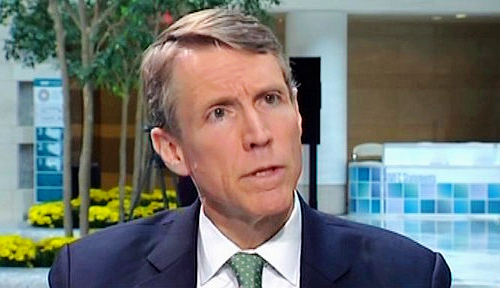
Former US Undersecretary of Treasury Timothy Adams speaks to PDO Biz
The Elite Talk program by Li Zhenyu from People's Daily Online Biz ChannelEver since Chinese President Xi Jinping championed the Chinese Dream concept at start of his tenure last year, the catchphrase has generated a substantial buzz and become a favored topic among China watchers. Timothy Adams is one of those elite observers.
Having traveled extensively throughout China, Mr. Adams is the former Undersecretary for International Affairs at the US Treasury Department and the current President and CEO of the Institute of International Finance (IIF). While at the White House, he was the George W. Bush administration's point person on international financial and economic issues.
He joined the Elite Talk to talk about his reading of the Chinese Dream. The former US Undersecretary of Treasury believes the Chinese Dream may lift China's social aspirations and is complementary to the American Dream. Here's our talk.
TranscriptHost: You know, Chinese President Mr. Xi Jinping has put forth a new doctrine — the Chinese Dream, which has become a buzzword both in and out of China. So, what is your interpretation of the Chinese Dream?
Timothy Adams: Well first of all, I think it's great to talk about social aspirations. You know, in the US, we talk about the American Dream, and it varies from person to person and family to family. What the American Dream really talks about is social mobility, economic mobility and economic opportunity.
And I don't want to speak for China's president, but I think the idea is for China and China's population to have high aspirations. And China does and China should, because it's a great country and it has enormous opportunities.
But I think what President Xi says is to challenge people to have big dreams and to create the idea of economic mobility and economic progress. And I think those are good and really noble characters.
Host: How do you think the so-called Chinese Dream will affect the US and the global economy?
Timothy Adams: Well, I think it's complementary. You know, it's in the United States' interest to have a growing and prosperous and developing Chinese economy, an economy that is vibrant, and is growing more important and more integrated in the global economy. So I think it's complementary to the American Dream.
Host: Speaking of the American Dream, the concept became prominent during the 1960s after a decade of strong growth that is referred to as the golden age. The Chinese Dream also comes after a golden era of growth. So, would you care to make a comparison of the two dreams — the Chinese Dream and the American Dream?
Timothy Adams: First I guess I would argue that the American Dream has been a part of American history for centuries. You know, my ancestors in the early 18th century left Ireland — they were Scotch-Irish — and went to the United States in order to have a better life and make a life of their own.
So, I think throughout US history, the American Dream is about having the capacity and the opportunity to better oneself and not be stuck in social constraints and economic constraints.
So I think that's the idea that individual and family have the capacity to better themselves. And that's obviously easier to do in a period of rapid economic growth when everyone is doing well together.
Related:
Timothy Adams on China's currency reform
 Chinese Kung Fu charms Silicon Valley
Chinese Kung Fu charms Silicon Valley
 Tranquil Yankou ancient town
Tranquil Yankou ancient town
 Lake Geneva: A show of swans
Lake Geneva: A show of swans
 Beautiful sunset over the Irtysh River
Beautiful sunset over the Irtysh River
 Qingjing Mosque: Witness of the ancient Maritime Silk Road
Qingjing Mosque: Witness of the ancient Maritime Silk Road
 Neiliansheng – more than 100 years of fashion
Neiliansheng – more than 100 years of fashion
 Golden retriever feeds baby African lions
Golden retriever feeds baby African lions
 Strange rocks in Lama Mountain
Strange rocks in Lama Mountain
 First overseas "China-standard" electric railway laid
First overseas "China-standard" electric railway laid
 College graduate launches organic agricultural cooperative in hometown
College graduate launches organic agricultural cooperative in hometown




 Opening ceremony of 67th Cannes Film Festival
Opening ceremony of 67th Cannes Film Festival Pulse of Xiamen - Int'l Yoga art festival in May
Pulse of Xiamen - Int'l Yoga art festival in May Photo story: Life of a scrap metal recycle worker
Photo story: Life of a scrap metal recycle worker Training of the PLA's first female honor guard
Training of the PLA's first female honor guard China's 10 must-see animations
China's 10 must-see animations Female bodybuilders show their beauty of fitness
Female bodybuilders show their beauty of fitness A taste of Harbin cuisine
A taste of Harbin cuisine A bite of Jiang Nan
A bite of Jiang Nan Who is China's campus beauty queen?
Who is China's campus beauty queen? 8 great movies to watch with your mom
8 great movies to watch with your mom China's most luminous celebrities
China's most luminous celebrities Newly recruited police in Hetian hold drill
Newly recruited police in Hetian hold drill  Bird-men compete flying in Hong Kong
Bird-men compete flying in Hong Kong  The 'Chinese Dad'
The 'Chinese Dad' Shanghai locals bid farewell to childhood memories
Shanghai locals bid farewell to childhood memories